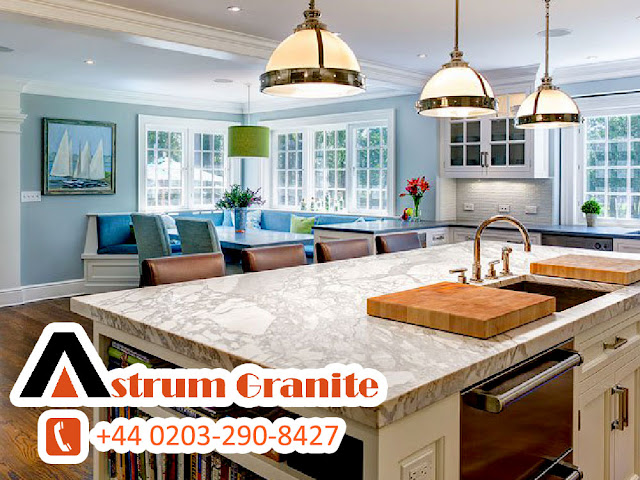Picking another kitchen worktop is intense as you need to ensure you've picked something solid, down to earth, ravishing, immortally in vogue, the great incentive for cash and that you'll cherish for quite a long time. Regardless of whether you've limited the decision down to a stone worktop, for example, marble, rock, limestone or quartz, at that point there are as yet many alternatives accessible. Beneath, we clarify a portion of the contrasts between various kinds of worktop however on the off chance that you have any more inquiries, simply call us – our group is close by to enable you to pick the correct surface for your new kitchen.
Natural Stone kitchen worktops versus different surfaces
One reason it's difficult to pick between, marble, quartz, and Granite kitchen worktops is that stone has various critical focal points over most other worktop materials. For instance, all stones – even 'delicate' stones like marble – are:
· Accessible In Numerous Hues And Surfaces =
· Slice To Accommodate Your Correct Kitchen
· Accessible In A Scope Of Completions, Cleans And Edge Subtle Elements
· Difficult To Chip Or Scratch
· Warm Safe – Regardless Of Whether You Put A Hot Skillet Some Tea Down
· Fire And Fire Safe
· Unaffected By Chilly
· Nourishment Safe
· Won't Blur In Daylight
· Simple To Clean
· Heavier Than Wood, Lino Or Tiles
Should be cut, formed and cleaned utilizing extraordinary devices
What’s more, have next to zero grouting to stain or decay away
Stone additionally goes about as a warmth sink, which is the reason proficient baked good cooks and chocolate creators utilize marble or Granite kitchen worktops to make their items.
Characteristic versus designed stone
Because of current advancements, it is presently conceivable to make the stone in a manufacturing plant, utilizing holding operators or innovative procedures to tie stone particles together into new structures. They are frequently made essentially of normal quartz. These inventive items are known as 'built' or 'handled' stones, to separate them from 'normal' stones like marble, rock, and limestones which are shaped in the world's surface and mined from quarries.
Built stones have been painstakingly intended to satisfy the capacity they're expected for. Accordingly, they're a perfect decision for kitchen and restroom worktops. And in addition the general points of interest recorded above, the built stone is:
- Accessible In Many Hues, Including Essential Hues And Gem Tones
- Accessible In Many Surfaces, From Plain To Complex
- Simple To Coordinate
- Made In A Scope Of Thicknesses, Reasonable For Various Utilizations, For Example, Divider Cladding, Worktops And Flooring
- Normally Non-Permeable, Which Amounts To Nothing Is Consumed By It – Not Smells, Microscopic Organisms, Fluid Or Anything
- Most Difficult To Recolor
- Waterproof
- Ordinarily 90-95% Quartz
By difference, characteristic stones are framed in topographical procedures, so their hues and surfaces are made by the shot. This implies regular stones are:
· Accessible In The Hues And Surfaces Nature Gives
· Every Section Is Totally One Of A Kind, So Might Be Difficult To Coordinate
· Can Be Permeable So Should Be Fixed Amid Fabricate Or Establishment
· Difficult To Recolor, Especially Subsequent To Fixing
Granite is one of the hardest materials on the planet, which is one reason stone kitchen worktops are so looked for after. This delightful stone is normally non-permeable, difficult to stain, scratch or chip and simple to think about. By complexity, marble is a more fragile stone as, despite the fact that it's intense as shake, it's permeable and responds with acids and soluble bases. This implies except if it is fixed it can recolor or be harmed by nourishment and fluids, for example, red wine, lemon juice, and vinegar. Luckily, fixing is extremely compelling and a standard piece of our procedure.



Comments
Post a Comment